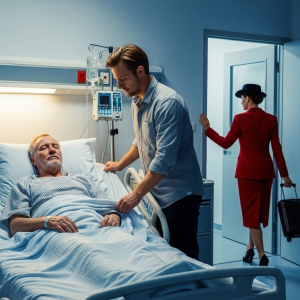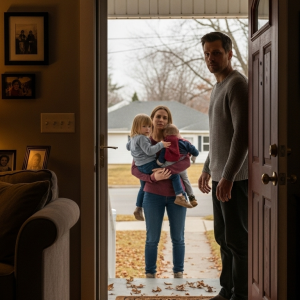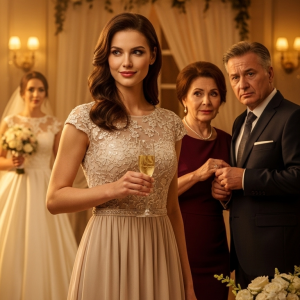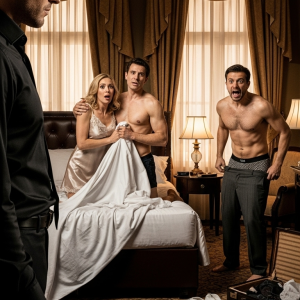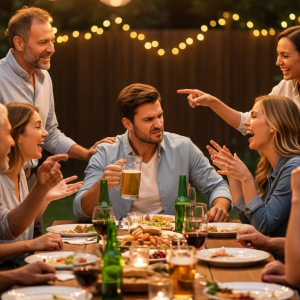My family forced me to become an alcoholic from the moment I was born. I mean that literally. My parents are the most feral people I’ve ever met. From the time I turned ten, their idea of quality time was teaching me and my older brother, Kyle, how to handle our liquor. Every Friday was “training night.” We’d sit at the kitchen table while Dad poured shots of tequila and Mom cheered us on. If we gagged, we did push-ups. The family motto: The family that drinks together, stays together.
It was a tradition passed down through generations. I thought it was nonsense, but Kyle took to it like a fish to water. By fourteen, he was Dad’s favorite drinking companion. When he started showing up to breakfast with shaking hands, Dad just laughed and poured him a beer, calling it “hair of the dog.” The more Kyle drank, the more love he got.
I became the family disappointment by default. Not for failing school, but for succeeding. Straight A’s, debate team captain, saving for college—all signs of a flawed character in their eyes. “Your problem is you judge everyone,” my mother would slur, stumbling into the furniture. “You need to loosen up.”
The day that changed everything was Kyle’s 18th birthday. He was doubled over on the porch, joking about the sharp pains in his side that had been bothering him for weeks. His skin looked slightly yellow in the porch light. Dad’s response? He brought out a $200 bottle of Scotch. “It’s nothing a good drink can’t fix,” he declared, slapping Kyle on the back. As Mom started filming the moment for his “future kids,” I realized that to survive, I had to play along. I became an actress worthy of an Oscar, fake laughing at their drunken stories while secretly pouring my drinks into potted plants. And the saddest part? It worked.
Leaving for Oregon State was like surfacing for air. My randomly assigned roommate was in alcohol addiction recovery, and through her, I discovered a world of people who had fun without poisoning themselves. I joined a campus sober support group, learned about addiction science, and for the first time, felt genuinely happy. I started training for marathons. During winter break of my sophomore year, I did something crazy: I decided to go home, armed with alcohol-free champagne and a fantasy that I could be the one to break the cycle.
The second I walked through the door, Dad shoved a beer in my hand. “There’s our college party girl!”
When I politely declined, saying I was training for a race, Mom’s face went dark. “Oh, so you’re one of those now? Too good for your own family?”
The night spiraled from there. When I tried to go to bed early, they followed me to my room with a bottle of tequila.
“You’re not ruining Christmas by being a sanctimonious witch,” Mom snarled.
What happened next still gives me nightmares. Dad pinned my arms while Mom tried to force the bottle into my mouth. I kept my jaw clenched shut, tears streaming down my face, until Dad grabbed my nose to cut off my air. When I finally gasped for breath, Mom poured tequila down my throat. I threw up immediately. They just laughed. “She’s out of practice,” they joked.
They spent the next hour trying to force more alcohol into me while I fought and screamed. Kyle watched from the doorway, too drunk to help. I pretended to pass out. When they finally left, I used my phone to record them through my cracked door, laughing about “breaking me back in.” Then, huddled in my closet, my throat burning, I called 911.
The sirens grew louder. I watched my parents freeze mid-laugh, their faces shifting from amusement to panic.
“Someone called the cops,” Dad hissed, stumbling back from the window. They both turned toward my room. I lay perfectly still as he stormed in and shook my shoulder. “She’s out cold,” he announced with relief.
Two officers stood on our porch. “We received a 911 call from this address,” the taller one said.
“Must be a mistake, officer,” Dad said, plastering on his salesman’s smile. “Just a quiet family night.”
That’s when I made my entrance, stumbling out of my room, vomit still streaking my hoodie. “They forced alcohol down my throat,” I rasped.
Mom rushed over, her grip like a vise on my arm. “Oh, officers, I’m so sorry. Our daughter has been having… mental health issues. She makes up these stories. We found her drinking alone in her room. We think she’s having a breakdown.”
Outside on the porch, I showed Officer Martinez the video on my phone. Her expression hardened. But my parents were masters of this game. While we waited for paramedics, Mom’s fingers flew across her phone. My phone started buzzing with texts from aunts, uncles, cousins. Traitor. How could you do this? Your mom says you’re having a breakdown. Get help.
At the station, things took a turn I didn’t expect. My Uncle Tony, a lawyer and their drinking buddy of three decades, burst in reeking of whiskey. He slapped a folder on the table. “My clients have been concerned about their daughter’s mental health for years. Here’s documentation.”
He produced medical forms from when I was sixteen, when I’d refused to drink at Thanksgiving. My parents had taken me to a doctor, claiming I was showing “antisocial behavior” and “paranoid delusions about alcohol.” They had built a paper trail.
“The video is taken out of context,” Uncle Tony said smoothly. “She has a history of doing things like this for attention.”
The betrayal stung worse than the alcohol burns. My parents hadn’t just failed me; they had spent years meticulously crafting a narrative to ensure no one would ever believe me. The system wasn’t just failing me; it had been rigged against me from the start.
My phone lit up. A Facebook notification. Mom had made a public post. Please pray for our family. Our daughter is struggling with mental health issues and addiction… She called the police on us tonight after we tried to stop her from drinking alone… Our hearts are breaking.
The comments poured in—prayers and support for my poor, long-suffering parents. My dad’s golf buddy from the local news station commented, “So sorry to hear this, buddy. Let me know if you need anything.” My reputation was crumbling in real time. My parents weren’t just two steps ahead; they were playing a different game entirely.
Then, the final, master stroke. As I sat in a cheap motel, the only place I could afford after they drained my bank accounts, the police knocked on my door. “Your parents have filed for an emergency psychiatric hold,” an officer said. “They’re concerned you might harm yourself or others.”
The paperwork was all in order, signed by a judge from my parents’ bowling league. I was handcuffed, placed in the back of a squad car, and driven an hour away, trapped in a web of my family’s making.
The 72-hour hold felt like a lifetime. On the third day, the psychiatrist, Dr. Patel, called me in. His expression was confused. “We spoke with your neighbor, Dr. Chen,” he said. “She provided some… interesting security footage. We also received calls from your college support group, your academic advisor, and your employer. Their version of events differs significantly from your family’s.”
I was discharged, but I was homeless, broke, and alone. Then, a text from Kyle’s girlfriend, Alexandra: I’m sorry. You were right. Kyle told me everything. He needs you.
I ran to the ICU. Kyle looked smaller in the hospital bed, his skin the color of old paper. “I’m dying,” he whispered, the words matter-of-fact. “My body’s shutting down. Mom and Dad… they brought me beer yesterday. Said it would make me feel better.” The cruelty took my breath away. They would rather watch their son die than admit their “tradition” had destroyed his liver.
“In my apartment,” he rasped, his grip surprisingly strong. “A box under the bed. Everything’s in there. Recordings, journals. Promise me… you’ll use it. Don’t let them do to others what they did to us.”
I found the box. It was an arsenal. Videos of our parents forcing drinks on him, smashing his AA sobriety chips with a hammer. It was his insurance policy.
Back at the hospital, I found chaos. My parents and Uncle Tony were in Kyle’s room, trying to force a pen into his shaking hand to sign over his medical power of attorney.
“STOP!” I burst through the door, holding up the USB drive from his box. “I have your videos, Kyle. Everything you documented.”
Mom lunged for the drive, but Alexandra blocked her. “I called them,” she said to me, referring to the doctors. “I couldn’t let them do this anymore.”
Dr. Chen appeared. “The patient has requested only his sister remain,” she said, her voice firm. In the hallway, the hospital’s patient advocate and a psychiatrist watched Kyle’s evidence with me. “This is clear evidence of abuse,” the psychiatrist said. “We’re contacting Adult Protective Services.”
The dam broke. Just then, Jessica’s father walked in, followed by parents from the other “training night” families. They were there to confess, to expose the years of coordinated abuse. The room erupted. Dad shouted about betrayal. Mom screamed about liars. In the chaos, Kyle’s monitor started to alarm.
“He needs the transplant list now,” Dr. Chen urged. “We’re running out of time.”
“I consent,” I said.
“You have no authority,” Uncle Tony sneered.
“Actually, she does,” Alexandra stepped forward, holding a document. “Kyle and I got married yesterday, in the hospital chapel. I’m designating her as our medical proxy.”
Mom let out a scream that could be heard three floors down. The psychiatrist placed a hold on both my parents for evaluation. As security escorted them away, still screaming about lawsuits, I saw something break in their eyes: the realization that their control was, finally, truly gone.
A liver match was found. The transplant was a success. Kyle would live.
The legal battles were intense, but the evidence was overwhelming. The videos, the other families’ testimonies, Dr. Chen’s security footage. My parents were convicted on multiple counts of child endangerment and assault. Their reputation, their social network, everything they had built on a foundation of alcohol and control, was destroyed.
I went back to college, working three jobs to get by. Kyle graduated from rehab and started working at a recovery center, using his story to help others. Alexandra gave birth to a healthy daughter, Sophia, who would never know the taste of tequila forced down her throat.
I ran my marathon that spring. My time was terrible, but I crossed the finish line.
Two years after that Christmas night, I received a text. It was a photo of Kyle, sober and smiling, holding Sophia at her second birthday party. The message read: Thank you for fighting when I couldn’t.
We lost our parents, our family, our home. But Kyle was alive. Sophia would grow up safe. The generational curse ended with us. The price was everything, and I knew, looking at that photo, that I would pay it again.
In the months after the trial, life didn’t magically become easy. People in our hometown still whispered. Some believed the court verdict; others clung to the lie my parents had spun for decades. A few times, when I stopped at the grocery store on my way to visit Kyle, I’d catch someone giving me that pitying, judgmental look — the one that said I heard what you did to your parents.
I stopped explaining myself. Let them think what they wanted. The people who mattered knew the truth.
Kyle’s recovery was grueling. The transplant saved his life, but his body had been through hell. There were days he couldn’t keep food down, nights when fever made him delirious. Alexandra was a rock through it all, and Sophia… Sophia was the light in that dim apartment. Kyle told me once, half-joking, “I think she’s the only reason I didn’t give up.”
I believed him.
Meanwhile, the box Kyle had given me — the one that started the dominoes falling — became the centerpiece of an investigation much bigger than just our family.
Turns out, “training night” wasn’t unique. There was a circle of families in our county who treated underage drinking as a twisted rite of passage. Most kept it “small scale,” but others… others had stories that made my stomach turn. Kids hospitalized for alcohol poisoning, forced drinking games at reunions, even one boy who nearly drowned after being shoved into a lake while blackout drunk.
Adult Protective Services and the DA’s office interviewed me for hours. I handed over every file, every USB, every note. It wasn’t just about revenge anymore — it was about stopping this before another kid ended up like Kyle.
One day, about six months after the trial, I got a letter from the DA.
Case Update: Multiple arrests made. Several parents charged. The “tradition” is being dismantled.
I read it twice, three times. For years, I’d thought no one could touch my parents because they were too embedded, too “respected” in their drunken little kingdom. But now, the cracks were spreading.
Not that my parents took it lying down.
From the psychiatric facility, Mom wrote me letters — half apologies, half venom. The first few tried to tug at my guilt: You’ve turned your back on your family. Blood is forever. Then they shifted: Enjoy your little moment. People will see through you eventually.
I didn’t respond.
Dad’s letters were worse. No attempts at softness — just rage. Pages of insults, threats about “what will happen when I’m out.” I gave them all to my lawyer.
The restraining orders were extended.
By the time Sophia turned three, Kyle was healthy enough to start working full-time at the recovery center. I visited every week, sometimes staying for the group sessions he ran. He had a way of speaking that made people listen — raw, unpolished, but honest.
One evening, after a session, he looked at me and said, “You know, we should start something. A real program for kids who grew up like us. Prevention, education… hell, even just a place to feel safe.”
It was the first time in years I’d seen that spark in his eyes.
So we did.
We called it Project Breakline — a name Kyle came up with. “Because sometimes the only way to save yourself,” he said, “is to break the line between you and the people who are supposed to protect you.”
We started small: a rented community hall, a few volunteers, basic workshops on alcohol abuse and consent. But word spread fast. Within a year, we had enough donations to open a permanent center. Schools began inviting us to speak. We partnered with local doctors and therapists.
Every time a kid came up after a talk and whispered, “That’s my family, too,” I felt the weight of what we were doing.
Then came the letter from the prison warden.
Your mother has requested to see you.
I stared at it for a long time.
Kyle said, “Don’t do it if it’s going to rip open everything you’ve worked for.”
But part of me needed to know — needed to see if there was anything left of the person who’d given birth to me.
The prison visiting room was cold, smelling faintly of bleach and overcooked food. Mom shuffled in wearing the standard jumpsuit, her hair thinner, face lined. For a second, I saw her as an old woman, not the force that had dominated my childhood.
She sat down, eyes scanning me. “You look good,” she said, almost surprised.
I didn’t answer.
“I wanted to tell you…” She hesitated, and for a heartbeat I thought she might actually apologize. But then: “You’ve ruined this family’s name. For what? Some pity? Attention?”
I laughed — sharp, humorless. “For survival. For Kyle. For Sophia. For every kid you would’ve broken if no one stopped you.”
Her mouth twisted. “You think you’re better than me.”
“I am better than you,” I said quietly. And then I stood up and walked away.
That was the last time I saw her.
Two years later, Project Breakline got state funding. We expanded to three counties. Kyle became something of a local figure — invited to panels, interviewed on the radio. Alexandra went back to school to become a counselor.
Me? I graduated, got my degree in public health, and took over as the program director. My days were filled with logistics, grant writing, and the occasional marathon training run. My time was terrible, as always, but I didn’t care.
Every so often, I’d think about that Christmas night. About the beer bottles on the kitchen table, the laughter that always had teeth. About how close I came to letting them mold me into another Kyle — but one who didn’t get a second chance.
And then I’d look at Sophia, giggling in the backyard with her little friends, a juice box in her hand, safe in a world where “training night” meant nothing more than board games and popcorn.
The generational curse didn’t just end. We burned it to the ground.
And in its place, we built something worth keeping.
